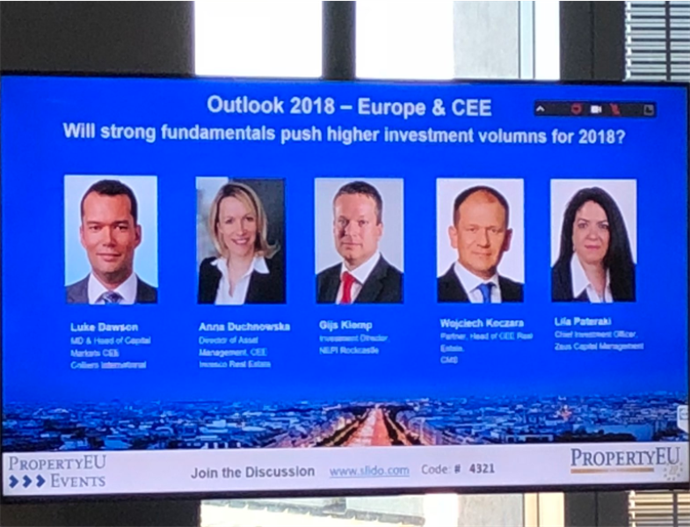Economic fundamentals trump political risk, as investors attracted by strong growth prospects continue to pour money into the real estate sector in Poland and Central and Eastern Europe.
'There are headwinds, but the economic indicators across the region justify the investment,' said Luke Dawson, managing director & head of capital markets CEE, Colliers International. 'Investors have a rational optimism, halfway between the extremes of euphoria and pessimism, so we are very bullish on prospects for 2018.'
Dawson was commenting during PropertyEU's Outlook 2018: Europe & CEE Investment Briefing, which was held at Colliers' offices in Warsaw this week.
GDP growth
The CEE economy is set to continue growing at a faster pace than the Eurozone, triggering a virtuous cycle of job creation, higher wages, consumer confidence and increased spending which is positive for real estate.
'A lot of real estate capital was raised in 2017, and there is even more money waiting to be deployed this year,' said Lila Pateraki, chief investment officer, Zeus Capital Management. ‘Demand is set to increase further in 2018.'
The final figures are not in yet but, according to Colliers International data, 2017 real estate transaction volumes will be in the €12 bn range, matching 2016's €12.2 bn figure and close to the cyclical peak of €13 bn reached in 2007 before the crisis.
'It has been an impressive performance in 2017 and we expect even more exciting times ahead,' said Piotr Mirowski, director CEE Investment Services at Colliers International Poland. 'Last year for the first time the pace of growth in CEE outperformed EMEA, reflecting the positive sentiment about the region. It is still a small percentage of the European market, but its share has increased from 3% to 4.5% and keeps growing.'
What really matters, Mirowski said, is that 'CEE is now seen as a mature key market, with good liquidity and pricing, and this change is reflected in the composition of investors. We still see the usual suspects from the US and UK who have been investing for years, but what is encouraging is the inflow of new money, particularly from the Far East.'
Risks
Increasing political risk has had one noticeable consequence in the withdrawal from the market of some more cautious German institutional investors.
'Conservative German funds are concerned and are suspending their investments in some parts of our region because the outlook is uncertain,' said Wojciech Koczara, partner, head of CEE Real Estate, CMS Poland. 'However, the economy is doing well so we are seeing funds coming in from other parts of the world like Asia, America and South Africa who are more used to challenges of this kind and can deal with them.'
Political risk is very much in the eye of the beholder, said Gijs Klomp, investment director, NEPI Rockcastle: 'We come from a different geography and see things differently. Our shareholders are mainly South African institutions and in their perception, Eastern Europe is not riskier than Western Europe.'
Hungary, which was shunned for years but is now in great demand, is a clear example of how investors learn to focus on the opportunities and deal with political issues.
Poland is now in the eye of the storm, with new taxes and regulations being brought in, as well as political tensions between Warsaw and Brussels. But it seems that for every cautious German investor who is sitting on his hands there are two from other countries around the world eager to deploy capital in the region.
'There will be fewer Germans but more pan-European or Asian investors coming in to replace them and we have even had interest from Australian investors recently,’ said Anna Duchnowska, director of asset management, Invesco Real Estate Poland. ‘There is a definite change in the investor base.'
___________________________________
Outlook briefings
PropertyEU's coverage of the real estate markets in Central and Eastern Europe continues with a panel discussion in Budapest on 1 February.
Outlook 2018: Europe & CEE Investment Briefing
MÜPA Budapest, Komor Marcell u. 1., Budapest, Hungary
09:00 - 11:30
Seating is complimentary but limited


































